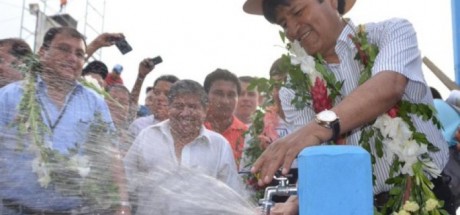Bolivian President, Evo Morales visits Silala water spring in South Bolivia. Photo: luminota.com
(The Real Agenda) Landlocked Bolivia claims Chile must pay for its use of a natural spring water born on Bolivian territory.
Fresh water is “the most important resource for mankind”. That is how the liquid is defined by the United Nations Educational, Scientific and Cultural Organization (UNESCO), which also highlights that water can be a “potential source of welfare or misery, cooperation or conflict.”
In the case of Bolivia and Chile it seems that only the last option is contemplated for now.
The International Court of Justice in The Hague (ICJ) will decide this year on the Bolivian allegation that it needs to have a way to the ocean, which directly involves Chilean territory.
From La Paz, the Bolivian government asks that Chile negotiates a sovereign access to the sea that Bolivia lost in the Pacific War in 1879, when it lost 400 kilometers of coastline and 120,000 square kilometers of land.
A second conflict has brewed since Bolivia submitted its first request to access to the sea. Evo Morales’ has now added a request that involves the natural water springs in Silala, which Chile considers to be an international river.
La Paz says that it is a spring and wants compensation for the use that Chile has made of it for decades.
The Bolivian Senate estimated that the retroactive payment must be of at least one billion dollars.
“Every day Chile is illegally and artfully taking advantage of this natural resource without compensating us a penny. This abusive and arbitrary act that violates our heritage can not continue,” said Morales on March 23, the Day of the Sea, when Bolivia commemorated the 137 anniversary of the loss of its coastal territory.
According to a study by the National Service of Meteorology and Hydrology of Bolivia, Chile consumes 4.8 million cubic meters of water a year from the Silala springs, so its consumption until the beginning of the century exceeded 449.7 million cubic meters.
The fact is that the water that flows from Silala supplies several towns in northern Chile. The distribution of water from that source is done through artificial channels.
These waters are born in Bolivia, in the region of Potosi and empty into the Pacific, already in Chilean territory, in the region of Antofagasta.
Morales’ Executive plans to open another front at the ICJ, the principal judicial organ of the United Nations, after it declared it had jurisdiction to arbitrate the conflict related to the landlocked Bolivia.
“We come to see the water in Silala to show the world that it is not an international river but water coming out of the ground, therefore, they are springs,” said Morales during his visit to the Quetana Chico county in the border with Chile.
The opposition fears that all this controversy might be a smokescreen to divert attention from corruption allegations that have come to light against Morales.
The current president is being accused of influence peddling of his former partner, Gabriela Zapata, which apparently is related to links between her and the state concessions to the Chinese company CAMC.
Both Chile and Bolivia negotiated an agreement for companies in northern Chile to pay for the use of water from Silala, but the document was not signed because the region of Potosi demanded that Chile also paid the “historic debt” for the consumption of these resource for over a hundred years.
The controversy began in the early twentieth century. In 1908, the prefecture of Potosí authorized a concession to the British company The Antofagasta and Bolivia Railway Company Limited for the use of the waters of Silala for steam locomotives traveling between Chile and Bolivia after the Pacific War.
Chilean Foreign Minister, Heraldo Muñoz, replied to Morales a few days ago with a map that accompanied the 1904 bilateral treaty to support the position of his country. Bachelet, meanwhile, said that her government will countersue Bolivia’s claim at La Hague.
In the past, Chile claimed that the ICJ was not competent to settle the demand because it believes that the issue in dispute, territorial sovereignty and the nature of access of Bolivia to the Pacific, was arranged by an agreement on the Treaty of Peace and Friendship of 1904, which governs the dispute until today. That agreement was signed 25 years after the Pacific War.
In addition to claiming that Chile owes Bolivia compensation for using the water from Silala, Morales also accused Chile of having “unilaterally diverted the Lauca River.”
This is another dispute between the two countries which in 1962 caused the rupture of bilateral relations. Bolivia and Chile resumed relations between 1975 and 1978 to try to negotiate Bolivia’s demand for access to the Pacific, but the talks failed.
Luis R. Miranda is an award-winning journalist and the founder and editor-in-chief at The Real Agenda. His career spans over 18 years and almost every form of news media. His articles include subjects such as environmentalism, Agenda 21, climate change, geopolitics, globalisation, health, vaccines, food safety, corporate control of governments, immigration and banking cartels, among others. Luis has worked as a news reporter, on-air personality for Live and Live-to-tape news programs. He has also worked as a script writer, producer and co-producer on broadcast news. Read more about Luis.
The article Water Wars Heat Up In South America published by TheSleuthJournal – Real News Without Synthetics







